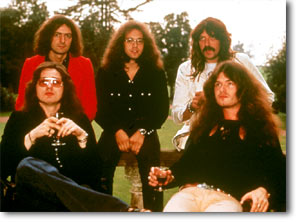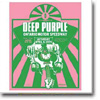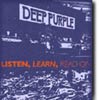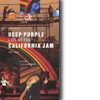
| |
||||
|
When Gillan and Glover left the Mk 2 line-up in June 1973 the rest of the band wasted little time in putting Ritchie Blackmore's plans for a new Deep Purple into effect.
Blackmore and Paice had already checked out Trapeze bassist Glenn Hughes and offered him a position. Paul Rodgers was offered the vacant vocalist slot but decided against joining. This lead to auditions and the eventual recruitment of the unknown David Coverdale, who had a bluesy quality to his voice and the physical presence to front the new band. Worries about whether fans would accept a new line-up had to be put to one side and the band immediately got to work on a new album.
'Burn' appeared in February 1974, maintaining Deep Purple's rock standing, as well as taking their music in a new direction. Tracks such as 'Mistreated' and 'Burn' quickly became classics, especially when their true power came through on stage. Even before the album had been released the band were on the road, their stage show uncompromisingly kicking off with four new tracks. Only two Mk 2 songs were included in the main body of the set, and both of those were heavily reworked. In truth neither new vocalist sounded comfortable with them, but recreating Mk 2 was not a prime requirement of the new members. The band's lengthy 1974 US tours were undertaken on an almost military scale which, along with the limos and private jet, were a big step up from previous visits. The first Mk 3 US tour climaxed in April 1974 at the California Jam festival, with the band's biggest ever crowd, estimated at over 200,000. On tour, the music soon began to slip from Blackmore's control. Hughes' funk leanings were pushing to the fore, and that process carried over into the recording of the 'Stormbringer' album in the late summer of 1974. All the band wanted to do their own thing to some degree and it began to look as if a White Album style double would be required to accomodate everyone's input. However, when Ritchie Blackmore's (admittedly odd) request to cover an old Quatermass track 'Black Sheep Of The Family' fell on stony ground he ended up taking a relative back seat in the studio. 'Stormbringer' took shape blending rock, soul and funk in a way that was quite ahead of its time. It was released in double quick time in December 1974. Blackmore then followed his own muse by recording the 'Ritchie Blackmore's Rainbow' solo album in early 1975, backed by members of Deep Purple's regular support act Elf. By the start of a short European tour in March 1975 Purple's management knew that Blackmore was intending to leave. The last three shows of the tour were recorded for posterity and appeared in 1976 after the band's ultimate demise as 'Made In Europe'. To the surprise of many, including some of the band, Coverdale and Hughes were determined to carry on despite Blackmore's departure and they were all soon searching out a new guitarist. In Tommy Bolin they seemed to have found a player with a natural feel for all the musical directions which were now spilling over into Deep Purple's music. Reinvigorated, the band joyfully plunged themselves into rehearsals for a new album in June 1975. ....
1973-1975 Deep Purple Mk3 Discography ....
.... Notable Post 1975 Deep Purple Mk3 Releases ....
.... Deep Purple Mk3 On PAL Video / DVD....
....Deep Purple Mk3, Further Reading....
|
|||||||||||||||||||||||||||||||||||||||||||||||||||||||||||||||||||||||||||||||||||||||||||||||||||||||||||



























